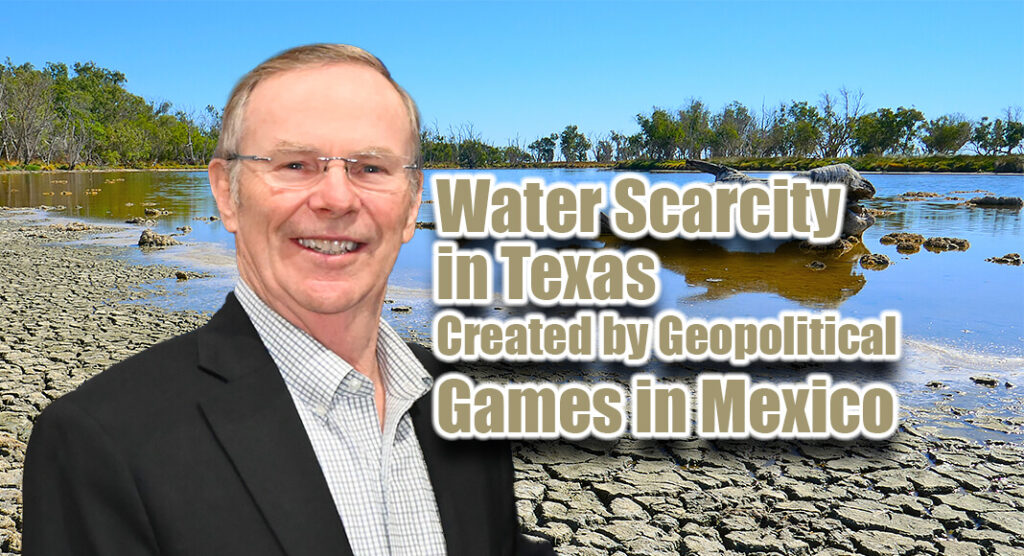
Texas Border Business
The McAllen Citizens League (MCL) has always promoted community engagement and informed discourse in McAllen, Texas. At a recent event hosted at the Rio Bank, the 2024 Platinum sponsor, the League continued its tradition by focusing on economic updates relevant to the local and regional community.
A highlight of the meeting was an unplanned speech by Jim Darling, former Mayor and City Commissioner of McAllen. Despite not being scheduled to speak, Darling was called to the podium to address a pressing concern inadvertently raised by an audience member—the issue of water scarcity and its management, particularly regarding Mexico’s obligations and policies.
Darling explained the complex water dynamics between the United States and Mexico, emphasizing the longstanding deficit in water delivery from Mexico, as per the 1944 treaty obligations. He detailed the critical status of agricultural water supply in the region, pointing out the severe economic losses amounting to $200 million due to inadequate water for agriculture. This situation is aggravated by bureaucratic delays and geopolitical implications affecting water distribution policies. “Attributable also to the draught, the lack of water from US rivers and Mexico rivers between their dams and the reservoirs, but the easy fix is for Mexico to deliver what the treaty requires- they have the water,” Darling emphasized.
However, Darling highlighted significant political and logistical challenges impacting water distribution between the United States and Mexico.
He pointed out that Mexico is currently 700,000 acre-feet behind on their water obligations over a five-year cycle, influenced partly by electoral politics and a lack of concern for immediate repercussions. Furthermore, internal politics aggravate the issue, as the Mexican president’s unfavorable stance towards the state of Tamaulipas complicates water sharing.
Mexico has been reluctant to release water to the U.S. since any allocation to the U.S. would necessitate a larger release to Tamaulipas, following local water-sharing agreements. Consequently, this standoff has led to a prolonged six-year period during which the U.S. has yet to receive expected water shares. According to Darling, the last significant water transfer from Mexico came from Falcon Lake, a strategy likely chosen By Mexico to avoid obligations to Tamaulipas. Darling pointed out that despite owning substantial reserves at the bottom of the reservoir, logistical challenges prevent efficient water transport to U.S. agricultural areas, severely impacting the sector.
Furthermore, Darling highlighted the efficiency disparities in water transportation from the source to different cities. He noted that McAllen benefits from its geographical positioning, losing only 5% of water in transit, compared to cities like Raymondville, which may lose up to 70% due to longer transit routes.
Darling also raised the issue of water rights and ownership. He discussed the challenges cities face regarding water ownership and the logistical and legal hurdles in securing water supplies independently from regional water districts.
“The International Boundary and Water Commission (IVWC) Commissioner the reservoir systems managed by a group from Mexico and a group from the United States under the 1944 treaty. Darling said, “Our people there are trying hard to push Mexico to do something.” He continued, “We’ve drafted a minute order modifying this 1944 treaty. We’ve approved it. The State Department of Mexico is reviewing it, which they’ve been doing for approximately 80 days. So, there’s no long-term solution,” he finalized.
Darling painted a blunt picture of both nations’ bigger water management issues, stressing the urgency of working together for sustainable solutions.
The International Boundary and Water Commission (IBWC) plays a pivotal role in managing water resources and addressing boundary issues between the United States and Mexico. The IBWC is instrumental in handling boundary demarcation, national ownership of waters, sanitation, water quality, and flood control through boundary and water treaties. This bilateral agency is crucial for resolving disputes and fostering cooperation over shared water resources such as the Colorado River and the Rio Grande/Rio Bravo.
Management of Falcon Lake and Amistad Reservoir
Falcon Lake, also known as Falcon Reservoir, is a significant example of bi-national cooperation managed by the IBWC. Situated on the Rio Grande and forming the border between Texas, USA, and Tamaulipas, Mexico, Falcon Lake was created by damming the river in the 1950s for multiple purposes, including water conservation, irrigation, hydroelectric power, and flood control. The management of Falcon Lake by the IBWC is critical for overseeing the allocation and quality of water and ensuring compliance with treaty obligations regarding the shared water resources along the U.S.-Mexico border.
Similarly, Amistad Reservoir, located further up the Rio Grande, serves as a border between Texas and Coahuila. Created by the construction of Amistad Dam in 1969, its primary functions include water storage, flood control, hydroelectric power generation, and recreational opportunities. The IBWC’s management of Amistad Reservoir guarantees the equitable distribution of water resources, the maintenance of flood control measures, and overall treaty compliance between the U.S. and Mexico.
The strategic management of these reservoirs by the IBWC not only mitigates the challenges of water scarcity and strengthens economic stability in border communities by ensuring sustained water supply and flood protection. This cooperative management framework is a model for addressing similar challenges in other cross-border regions.
See Related Stories:
Hidalgo County Updating Plans to Address Expected Water Shortage
Cornyn Discusses Mexico’s Delayed Water Deliveries with Secretary Blinken















